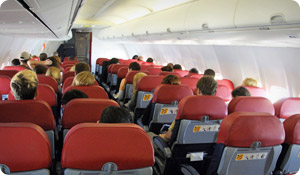
Have you ever gotten on an aiplane and watched, with more than a little envy, as your seatmate buckled up and fell fast asleep, just minutes after take-off? If you don't sleep easy in your own bed, you may have an especially hard time hunkering down on a plane. The best advice is to be as comfortable and sleep-ready as possible.
- Avoid stimulants, such as caffeine, prior to flying.
- Be tired when you get on the plane. Get a good workout in advance, but make sure it's earlier in the day, since exercise can actually be quite stimulating.
- Dress comfortably and wear or bring warm socks so you can take off your shoes.
- Use the bathroom just before you get on the plane. Although you want to drink plenty of fluids to stay hydrated when flying, that can mean waking up often and having to get up to empty your bladder when you would rather be sleeping.
- Remove your contact lenses when you get on the plane. Have your eyeglasses handy.
- Bring headphones that cancel out noise. Unexpected noises, like crying babies, children playing and in-flight announcements can all wake you up and keep you up. An iPod or other mp3 player, loaded with your favorite soothing music, blocks out some external sounds and can help you relax.
- Carry on a sleep mask to shield you from overhead reading lamps and other light, such as that from tv screens and your seatmate's electronic devices.
- If you drink alcohol, have just one drink (otherwise it may disrupt your sleep and cause you to have to get up to use the restroom).
- Pack a snack. Hunger can keep you awake and you may not be able to get food on your flight.
- Bring a small travel pillow, if possible. Even if you don't need it for your head, a pillow can help cushion another part of your body that needs a lift or is pressed against an armrest.
- If you find yourself stranded at an airport and in need of some shut-eye, you probably won't be any less comfortable sleeping in the lounge than you would be sleeping on the plane. Stash any valuables on your person in inside pockets, or in carry-on luggage that can be positioned in a way that it can't be reached without waking you up. Stay as close to your gate as possible and be sure to set a reliable alarm to wake you up.





